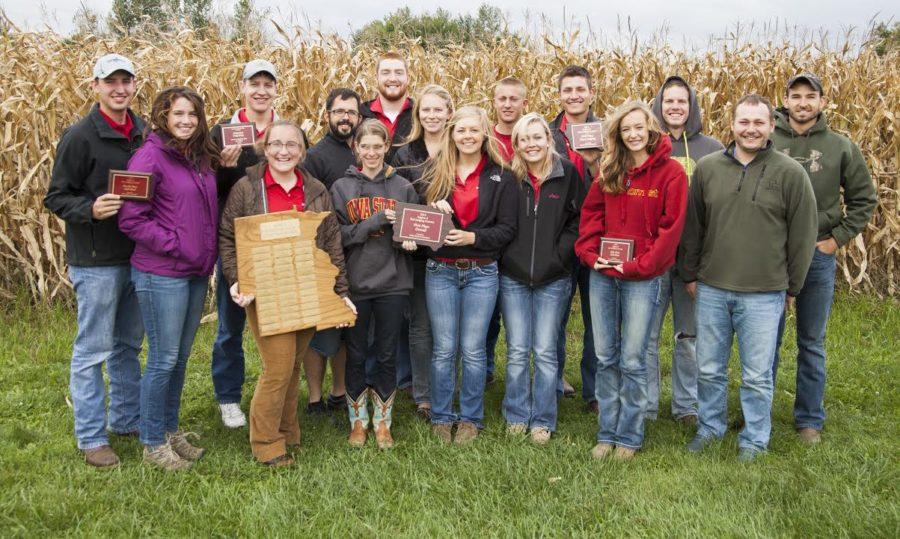Agronomy judges dig down deep
Courtesy of College of Agriculture and Life Sciences
On Oct. 2, the soils judging team, coached by Tom Lawler and Heidi Dittmer, both graduate students in agronomy, placed first in the team division at a regional competition in Ames.
October 20, 2014
In the basement of Agronomy Hall, there is a room with trophies, plaques, plates and awards stashed on top of the cupboards and cabinets. These awards display years’ worth of agronomic teams competing at knowledge-based events.
Iowa State’s Department of Agronomy is home to two unique types of competitive teams, the Crops Team and the Soils Judging Team. Both have recently earned titles.
On Oct. 2, the Soils Judging Team, coached by Tom Lawler and Heidi Dittmer, both graduate students in agronomy, placed first in the team division at a regional competition in Ames.
Iowa State’s team also contributed six of the top-10 individual-placed winners of the event. Individual places taken back to Ames included first, third, fourth, fifth, sixth and ninth.
The competition, authorized by the American Society of Agronomy and the Soil Science Society of America, contained three soils pits. The competing teams analyze and describe to the judges described the layers of soil in the pits, which were holes in the ground large enough to see layers of soil types.
“Soil judging is objective and subjective at the same time,” Lawler said. “Essentially, you need to describe what you see.”
Lawler said that competitions that occur once per semester have students look for many things. Topics included soil horizons, landscape, classifying using the Department of Agriclture Soil Taxonomy and interpreting soil type for land uses.
The team practices for these competitions with hands-on activities during class time, said Derek Rothe, team member and junior in agronomy. The five-semester team veteran said everyone works to help each other while the coaches answer questions they may have.
“It has made me more of a team player,” Rothe said.
He added that being on the team as a veteran has helped him collaborate with others and get comfortable voicing opinions to help others think differently.
“By allowing students to teach incoming students, they learn how to bring it back to the basics,” Lawler said.
Iowa State’s Crops Team, coached by Erik Christian, lecturer in agronomy, has also been earning titles this year by winning one first place and three second place awards since February.
“It’s a competitive team,” Christian said. “We compete with other schools on their agronomic knowledge.”
Crops competitions are split into four sections, he said. These sections are plant and seed identification; a lab practical that deals with insects, diseases and fertilizers; a written math exam; and a multiple choice general agronomy exam that can cover subjects from plant physiology to meteorology.
Training for this team is set up as a four credit class, with the top-10 students in the class earning a place on the team. Four of the 10 make up the AA team, the group that competes for the team title, Christian said.
The four most recent competitions for the crops team were hosted at Iowa State, Kansas State, Northwest Missouri State and in Australia.
“We try to tour and see different types of agriculture,” Christian said. “We like to meet and talk with farmers and agronomists as well.”
Kathryn Hoemann, senior in agronomy, says the team has proven to be a significant way to help her learn.
“This has been the single most important class in getting the background knowledge that I need to have,” the two-year team veteran said.
Christian said the team members devote a lot of time to studying the material, and they have a room devoted to this purpose. In the basement of Agronomy Hall, the crops team studies their material accompanied by trophies and plates of years past as they work toward another year of continued competition.
More information about the agronomy teams can be found through the department’s webpage at www.agron.iastate.edu.







